A personal story about life post menopause



From Times now news


Ending your day with a gratitude practice can help with stress management by shifting your focus from negative or stressful thoughts to positive ones. By reflecting on and expressing gratitude for the things you are thankful for, you can cultivate a sense of appreciation and contentment. This can help reduce stress and promote a more positive mindset, making it easier to relax and unwind at the end of the day. Additionally, practicing gratitude can help improve overall well-being and resilience, as it encourages a more optimistic outlook on life.






Stretching can help with stress reduction and stress management in several ways. Firstly, stretching helps to release tension and tightness in the muscles, which can be a physical manifestation of stress. By stretching, we can promote relaxation and improve blood flow to the muscles, which can help to reduce feelings of stress and promote a sense of calm. Additionally, stretching can also help to improve flexibility and range of motion, which can contribute to overall physical well-being and reduce the risk of injury. Overall, incorporating stretching into a stress management routine can be a beneficial way to alleviate stress and promote a sense of well-being.